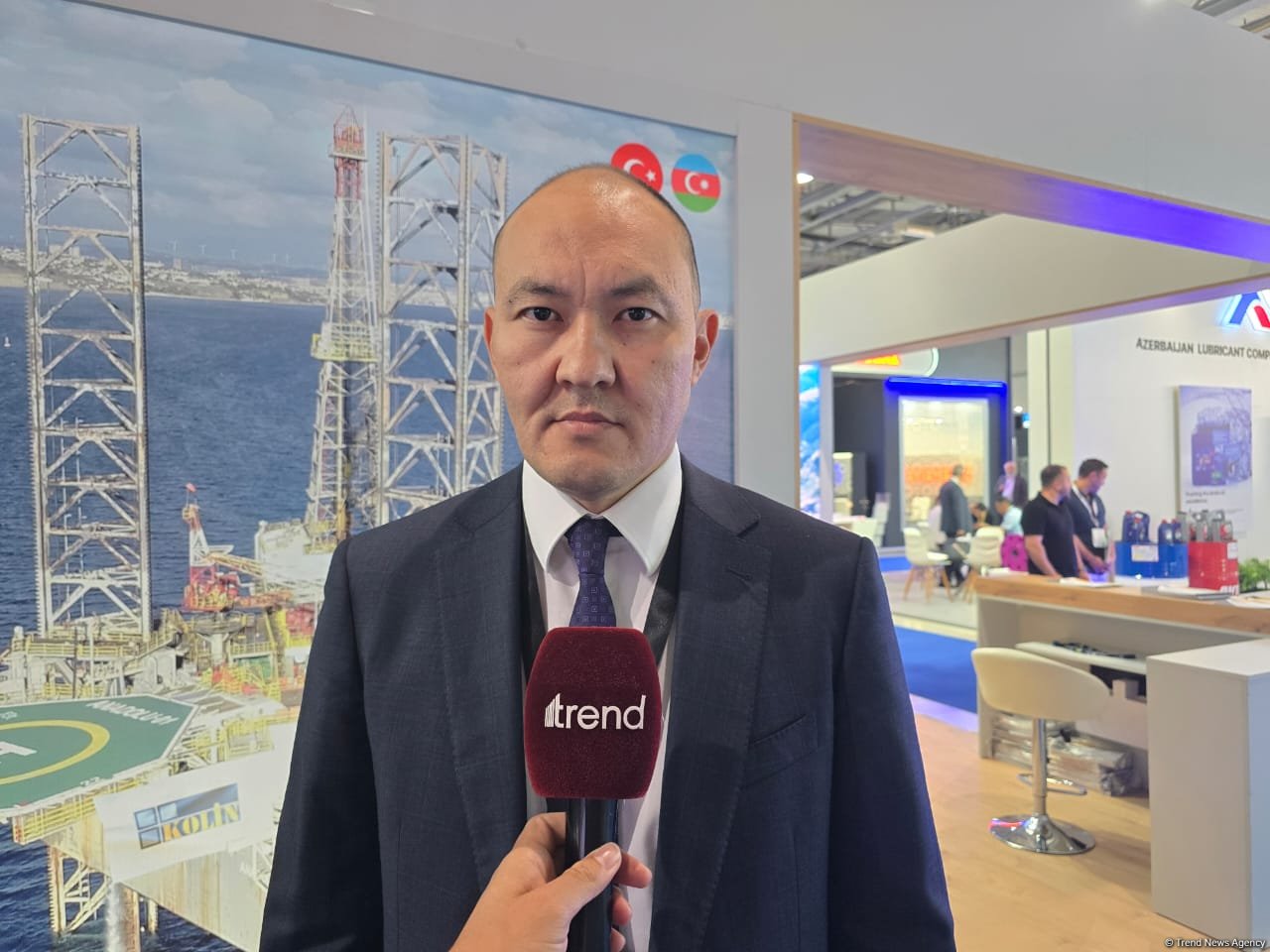BAKU, Azerbaijan, June 4. Azerbaijan is poised to play an increasingly crucial role in regional transport connectivity as freight shipments along the Trans-Caspian route are projected to increase significantly in the coming years, Asset Assavbayev, Secretary General of the Transport Corridor Europe-Caucasus-Asia (TRACECA), told Trend.
Speaking on the sidelines of the 30th anniversary of Baku Energy Week, Assavbayev emphasized that Azerbaijan’s strategic position at the crossroads of the North-South and East-West corridors enables it to contribute meaningfully to regional logistics growth.
“One key initiative is the Agreement on a Single Transit Permit, designed to streamline the permitting process for road freight transport by reducing the number of required authorizations.
Another major focus is digitalization. Thanks to the collaborative efforts of member countries, including Azerbaijan, we successfully demonstrated and implemented the exchange of electronic CIM/SMGS consignment notes for the first time.
Why is this important? Once fully adopted, this system will significantly shorten cargo transit times along TRACECA routes. The corridor includes both broad-gauge and narrow-gauge railway lines, which often complicate logistics. Whether transporting goods in containers or wagons, a consignment note is always required. The adoption of a unified, digital consignment note will not only simplify the process and reduce paperwork but also help increase cargo volumes across the corridor," he said.
Assavbayev stated that plans are in place to increase cargo transportation along the Trans-Caspian route to 10 million tons within the next three years.
The Secretary General also touched on recent growth.
“It’s important to note that the Trans-Caspian segment alone saw a 62 percent increase in 2024 compared to 2023. For perspective, while the cargo volume along the Kazakhstan-Azerbaijan-Georgia section of the Trans-Caspian route stood at 600,000 tons in 2021, it reached 4.2 million tons last year – more than an eightfold increase. We plan to continue this momentum.
To meet growing demand, TRACECA is prioritizing the construction and expansion of border checkpoints, ferry capacity across the Caspian Sea, and institutional reforms.
We must address bottlenecks like ferry availability. Weather conditions often cause backlogs, so expanding the fleet is vital. Similarly, developing border infrastructure remains a top priority," he added.
Digitalization efforts are also underway, with TRACECA working on institutional frameworks to enable data exchange across member states.
“As it stands, both private and public sector players emphasize the importance of digital data sharing, but there is no legal or institutional basis for it. That’s why we’ve drafted an agreement on digital cargo transport, currently being refined by TRACECA’s working group. Once signed, it will pave the way for all our digital initiatives.”
Assavbayev also emphasized the need for sustainable financing mechanisms.
“As part of our efforts to simplify transportation along the TRACECA route, we are proposing the signing of several key agreements. For example, within the TRACECA Working Group, we are developing an Agreement on the Digitalization of Cargo Transport. Currently, whether it's the private sector or state railway operators, everyone emphasizes the importance of information exchange. However, there is no formal framework for exchanging documents or data. What we need is an institutional foundation—an agreement that establishes the rules and standards.
We have already drafted this agreement, and the Working Group is now refining the text. Once adopted, it will pave the way for implementing various digitalization initiatives that have been widely discussed by representatives from railways, seaports, and other stakeholders,” said Assavbayev.
The Secretary General also addressed several challenges facing the corridor.
“Of course, we must also resolve the issue of ferry operations on the Caspian Sea. There is a need to increase the number of vessels operating between ports. Due to frequent weather-related delays, queues often form, so expanding the fleet is essential to improving efficiency.
Another key issue is the construction of new border checkpoints and enhancing the capacity of existing ones. This remains a top priority for TRACECA,” he continued.
Assavbayev emphasized that securing adequate financing is crucial for the successful implementation of all planned projects.
“To address this challenge, a significant decision was made during the TRACECA Intergovernmental Commission meeting held in Tehran in February 2025—we approved the establishment of the TRACECA Fund. This fund will serve as a vital institutional mechanism to pool financial resources for key infrastructure and development initiatives along the TRACECA corridor. In essence, it will help us overcome the financial constraints that currently hinder progress,” he said.
Assavbayev also noted that 10 billion euros will be allocated to support infrastructure projects under a EU initiative.
He further highlighted the strong interest shown by international financial institutions in TRACECA-related projects, particularly those involving the Trans-Caspian route.
“The latest studies—whether by the World Bank, the Asian Development Bank, or the European Bank for Reconstruction and Development—all indicate a high level of interest in the TRACECA corridor. A reorientation of cargo flows toward this route is expected, but at the same time, there is a growing need to scale up investments.
In this context, I want to highlight that under the European Union initiative aimed at strengthening connectivity within Central Asia and linking the region with the EU, 10 billion euros will be allocated to support infrastructure projects across TRACECA countries and along the TRACECA route.
I would like to particularly highlight the crucial role of Azerbaijan, which serves as a key link between the countries involved in the corridor. The country's ongoing efforts—modernizing the Port of Alat, upgrading railway infrastructure, and undertaking major construction projects to establish direct access to Nakhchivan and, ultimately, Türkiye—will have a significant and positive impact on the development of the Middle Corridor.
Given the strong growth in cargo volumes we anticipate, it is essential that these projects be implemented collaboratively. Only through joint action can we effectively manage the shifting cargo flows toward the TRACECA corridor—specifically the Trans-Caspian segment, known as the Middle Corridor. As this transformation continues, the strategic importance of the corridor will grow year after year,” said Assavbayev.
Stay up-to-date with more news on Trend News Agency's WhatsApp channel







